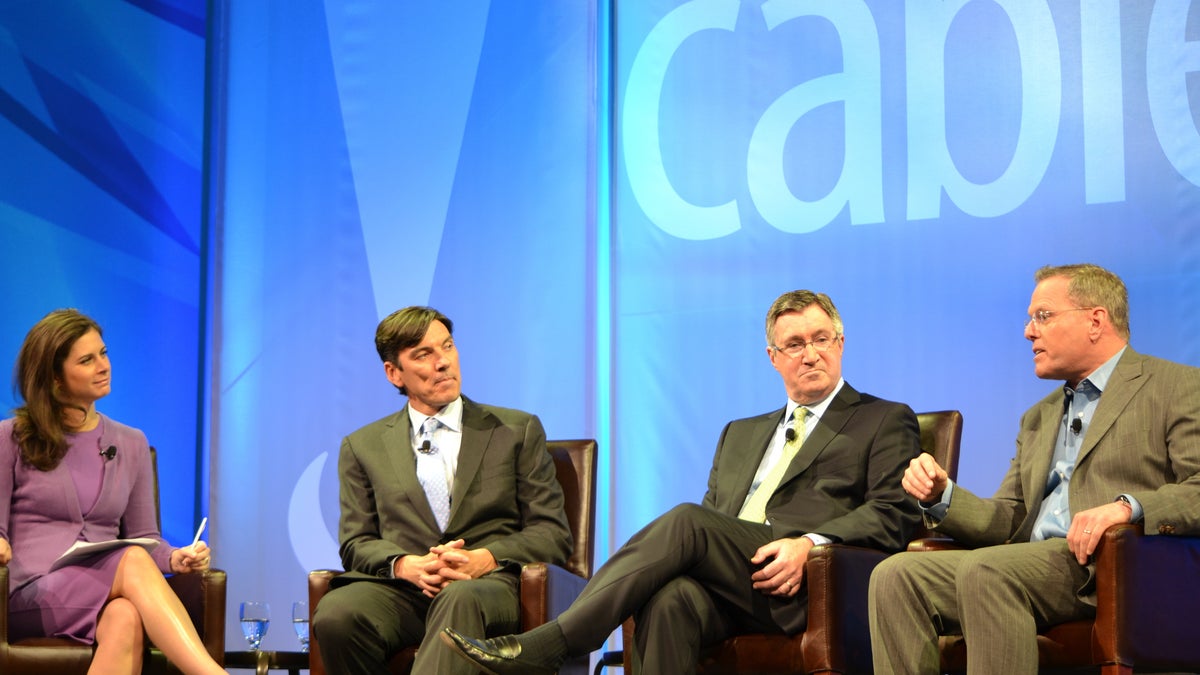Discovery CEO warns Dish Network against skipping ads
Discovery's CEO said Dish's new ad-skipping DVR tech could destroy traditional cable TV, possibly pushing up prices and limiting the amount of programming produced by undercutting ad revenue.

BOSTON -- Discovery Communications CEO David Zaslav warned Dish Network that it's playing with fire when it comes to a new commercial hopping DVR technology.
During a panel here at the National Cable and Telecommunications Association's annual tradeshow, Zaslav told CNN's Erin Burnett that the new feature Dish Network introduced recently on its Hopper DVR, which skips advertising during shows that are recorded from broadcast TV, could disrupt the industry in a negative way. He said the model is unsustainable since program owners need the advertising revenue to help cover the cost of their shows.
Dish co-founder and chairman "Charlie Ergen and Dish are a distributor of content," he said. "They need us to reach homes with our content. And if there is not going to be advertising fees, then there needs to be a lot higher subscriber fees."
The new Hopper DVR uses an ad erasing technology that is embedded in the device. Once turned on, the technology will erase all the advertising that has been recorded on TV shows that air over broadcast TV channels. So far, Dish has limited the technology to broadcast TV channels only.
The new technology is seen as a technological advancement for consumers, as it no longer requires them to fast-forward through commercials in pre-recorded programs. But advertisers and network owners, such as Zaslav's Discovery, say they feel they are under attack.
Time Warner Cable CEO Glenn Britt said such a technology could destroy the business that his company and others have spent 40 years building. Britt said that the business model the companies have created is a win-win for the industry and consumers. He said his company is in the business of providing consumers maximum choice of content. But without advertising revenue, consumers will instead face higher prices and potentially less content.
"The dual stream of advertising and subscription revenue has been great for content creators," he said. "We have more TV than we could have ever imagined. I don't think we want to destroy one of those revenue streams."
But AOL CEO Tim Armstrong said that just like in the Internet market where AOL operates, cable TV may have to rethink how it offers advertising.
"The video and cable industry need to think of advertising differently," he said. "The reality is that consumers today are super-engaged. How would you put advertising around that program or in a program, so that it doesn't look like traditional advertising? How do you make more engaging advertising?"
Zaslav said that his company has invested $100 million more on creating new content this year than it did last year. And it spent $100 million more on creating and supporting new shows, than it had one the year before that. But he said that without advertising revenue, his company won't be able to afford such investments.
One of the reasons that Discovery and other cable network companies initially held back on putting all of their premium TV shows on the Web was because there weren't business models to financially support the distribution, he said. But with cable initiatives, such as TV Everywhere that marry subscription services with advertising, an exciting business model has emerged, which he and other content owners can feel more comfortable to use.
He said that Discovery sees the TV Everywhere initiative, which will bring cable TV programming to smartphones, tablets and other mobile devices, as an exciting opportunity. But he admitted that these new business models are still evolving. And it's the traditional cable model that pays the bills for supporting its program development.
"The traditional cable business is what gets us the majority of our value," he said. "And now there are other people lined up who want our content, so we need to be responsible to get it to them in such a way that we don't diminish the value of our product."
Time Warner Cable's Britt added that cable-viewing households are actually getting a great bargain today on their TV service. He said that the average household spends roughly 400 hours a month watching TV. And he said that average consumers spend about $75 a month on cable TV.
"It's a deal," he said. "And when we think about the TV space, we need to keep that in mind. Most other things don't offer that kind of value."
Updated 10:52 a.m. PT: This story was updated with additional comments from the keynote this morning.

